Destination Specs¶
Http¶
More info please visit Fluent Bit 3.1.9 Http output
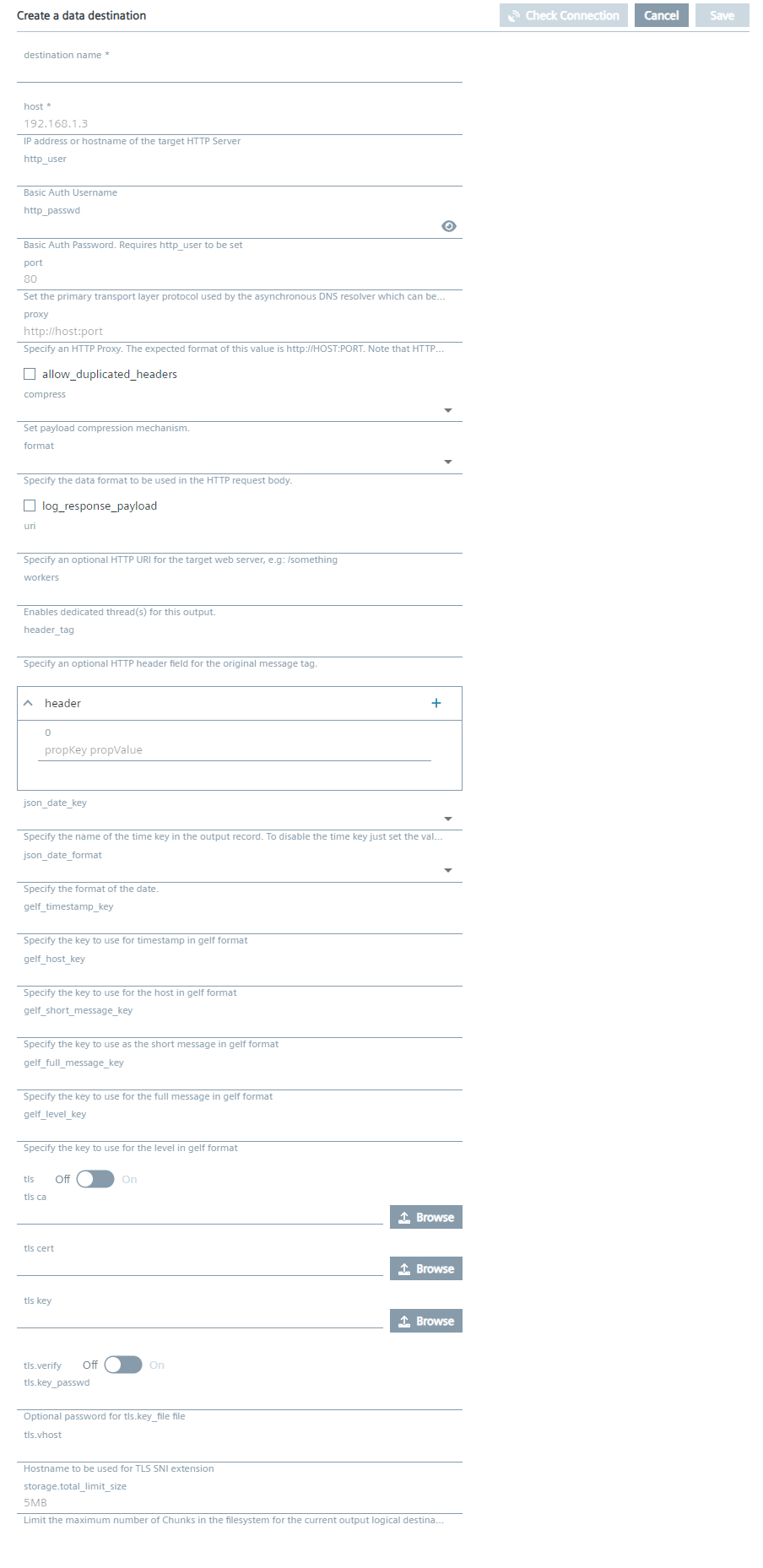
| Field | Description | required |
|---|---|---|
| destination name | name of destination | Yes |
| host | Http remote server | Yes |
| http_user | Basic Auth Username | No |
| http_password | Basic Auth password | No |
| port | http server port, default 80 | No |
| proxy | Specify an HTTP Proxy. The expected format of this value is http://HOST:PORT. Note that HTTPS is not currently supported. | No |
| allow_duplicated_headers | Specify if duplicated headers are allowed. If a duplicated header is found, the latest key/value set is preserved. , default is true |
No |
| compress | Set payload compression mechanism. Option available is 'gzip' , default is no compress | No |
| format | Specify the data format to be used in the HTTP request body, by default it uses msgpack. Other supported formats are json, json_stream and json_lines and gelf. default msgpack . More info please visit https://docs.fluentbit.io/ |
No |
| log_response_payload | Specify if the response paylod should be logged or not. default true |
No |
| uri | Specify an optional HTTP URI for the target web server, e.g: /something | No |
| workers | Enables dedicated thread(s) for this output. default 2 | No |
| header_tag | Specify an optional HTTP header field for the original message tag. | No |
| header | Add a HTTP header key/value pair. Multiple headers can be set. | No |
| json_date_key | Specify the name of the time key in the output record. To disable the time key just set the value to false. | No |
| json_date_format | Specify the format of the date. Supported formats are double, epoch, iso8601 (eg: 2018-05-30T09:39:52.000681Z) and java_sql_timestamp (eg: 2018-05-30 09:39:52.000681). default double |
No |
| gelf_timestamp_key | Specify the key to use for timestamp in gelf format | No |
| gelf_host_key | Specify the key to use for the host in gelf format | No |
| gelf_short_message_key | Specify the key to use as the short message in gelf format | No |
| gelf_full_message_key | Specify the key to use for the full message in gelf format | No |
| gelf_level_key | Specify the key to use for the level in gelf format | No |
| tls | Enable/disable tls ,default On |
Yes |
| tls.ca | upload ca certificate | No |
| tls.cert | upload local certificate | No |
| tls.key | upload local private key | No |
| tls.verify | Verify server side certificate or not | No |
| tls.key_password | The password which protects private key | No |
| tls.vhost | Fluent Bit supports TLS server name indication. If you are serving multiple hostnames on a single IP address (a.k.a. virtual hosting), you can make use of tls.vhost to connect to a specific hostname. https://docs.fluentbit.io/manual/administration/transport-security#connect-to-virtual-servers-using-tls | No |
| storage.total_limit_size | Limit the maximum number of Chunks in the filesystem for the current output logical destination. https://docs.fluentbit.io/manual/administration/buffering-and-storage#output-section-configuration | No |
Postgres¶
More info please visit Fluent Bit 3.1.9 postgresql output
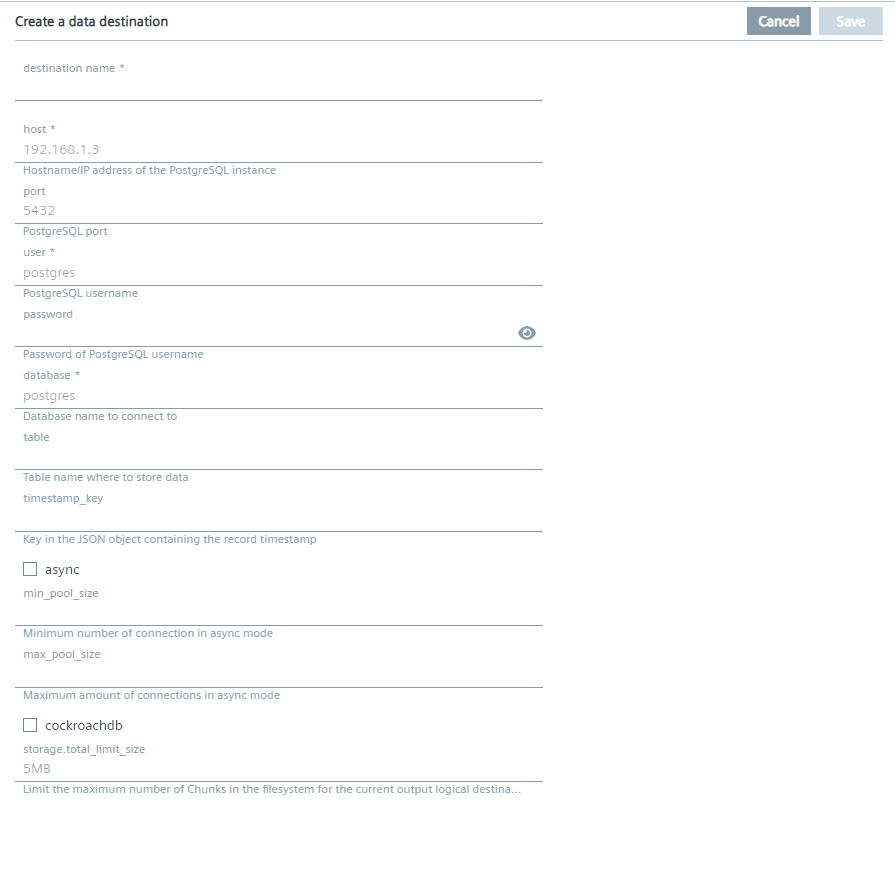
| Field | Description | required |
|---|---|---|
| destination name | name of destination | Yes |
| host | postgres server host | Yes |
| port | postgres server port, default 5432 |
No |
| user | postgres account | Yes |
| password | postgres password | Yes |
| database | postgres postgres | Yes |
| table | postgres table name | No |
| timestamp_key | Key in the JSON object containing the record timestamp , default date |
No |
| async | Define if we will use async or sync connections, default false |
No |
| min_pool_size | Minimum number of connection in async mode, default 1 |
No |
| max_pool_size | Maximum amount of connections in async mode, default 4 |
No |
| cockroachdb | Check it if you will connect the plugin with a CockroachDB, default false |
No |
| storage.total_limit_size | Limit the maximum number of Chunks in the filesystem for the current output logical destination. https://docs.fluentbit.io/manual/administration/buffering-and-storage#output-section-configuration | No |
DataDog¶
More info please visit Fluent Bit 3.1.9 DataDog output
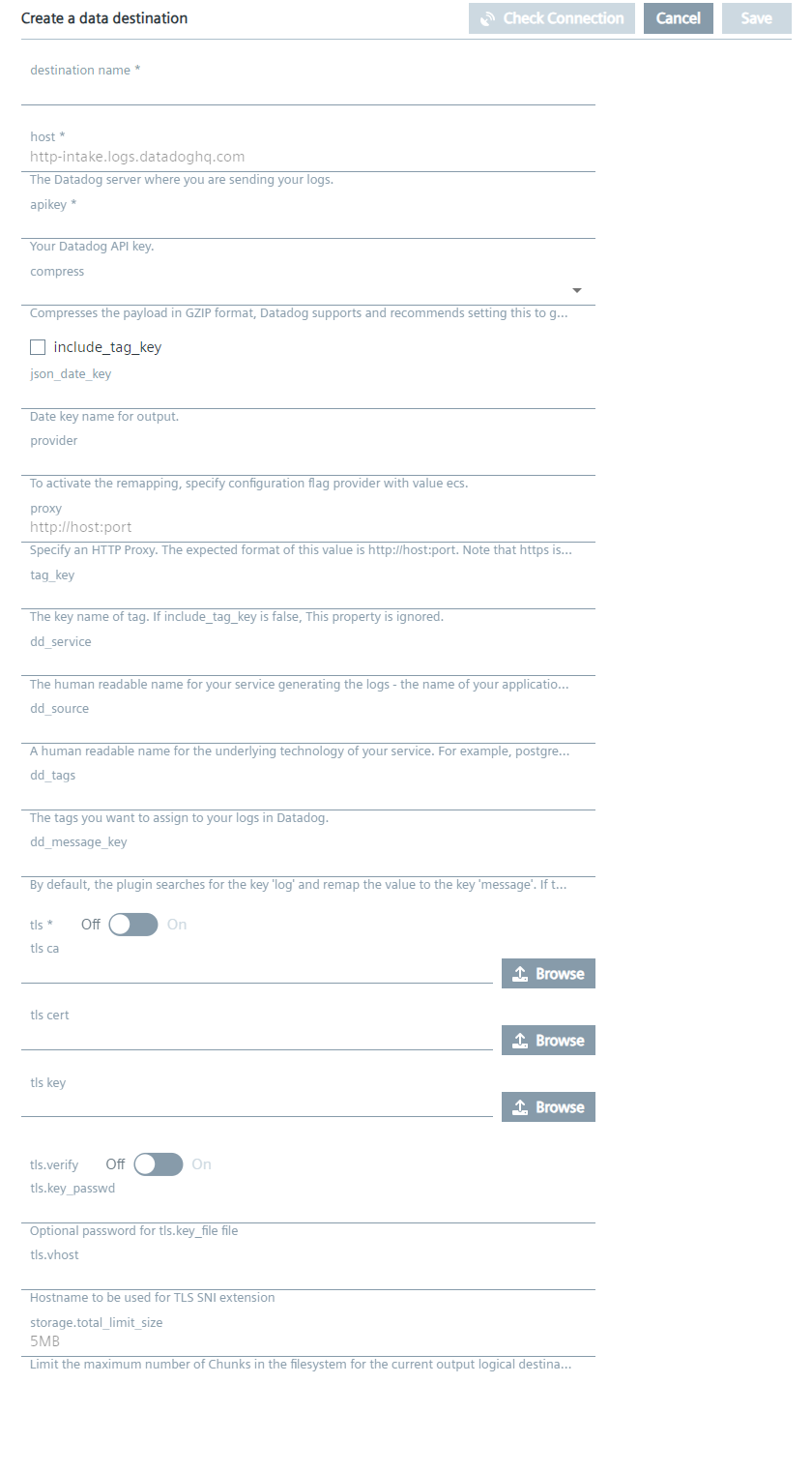
| Field | Description | required |
|---|---|---|
| destination name | name of destination | Yes |
| host | datadog host | Yes |
| apikey | datadog api key | Yes |
| compress | Set payload compression mechanism. Option available is 'gzip' , default is no compress | No |
| include_tag_key | If enabled, a tag is appended to output. The key name is used tag_key property. |
No |
| json_date_key | Date key name for output. , default timestamp |
No |
| provider | To activate the remapping, specify configuration flag provider with value ecs. | No |
| proxy | Specify an HTTP Proxy. The expected format of this value is http://HOST:PORT. Note that HTTPS is not currently supported. | No |
| tag_key | The key name of tag. If include_tag_key is false, This property is ignored. | No |
| dd_service | Recommended - The human readable name for your service generating the logs - the name of your application or database. | No |
| dd_source | Recommended - A human readable name for the underlying technology of your service. For example, postgres or nginx. | No |
| dd_tags | Optional - The tags you want to assign to your logs in Datadog. | No |
| dd_message_key | By default, the plugin searches for the key 'log' and remap the value to the key 'message'. If the property is set, the plugin will search the property name key. | No |
| tls | Enable/disable tls ,default On |
Yes |
| tls.ca | upload ca certificate | No |
| tls.cert | upload local certificate | No |
| tls.key | upload local private key | No |
| tls.verify | Verify server side certificate or not | No |
| tls.key_password | The password which protects private key | No |
| tls.vhost | Fluent Bit supports TLS server name indication. If you are serving multiple hostnames on a single IP address (a.k.a. virtual hosting), you can make use of tls.vhost to connect to a specific hostname. https://docs.fluentbit.io/manual/administration/transport-security#connect-to-virtual-servers-using-tls | No |
| storage.total_limit_size | Limit the maximum number of Chunks in the filesystem for the current output logical destination. https://docs.fluentbit.io/manual/administration/buffering-and-storage#output-section-configuration | No |
Influxdb¶
More info please visit Fluent Bit 3.1.9 influxdb output
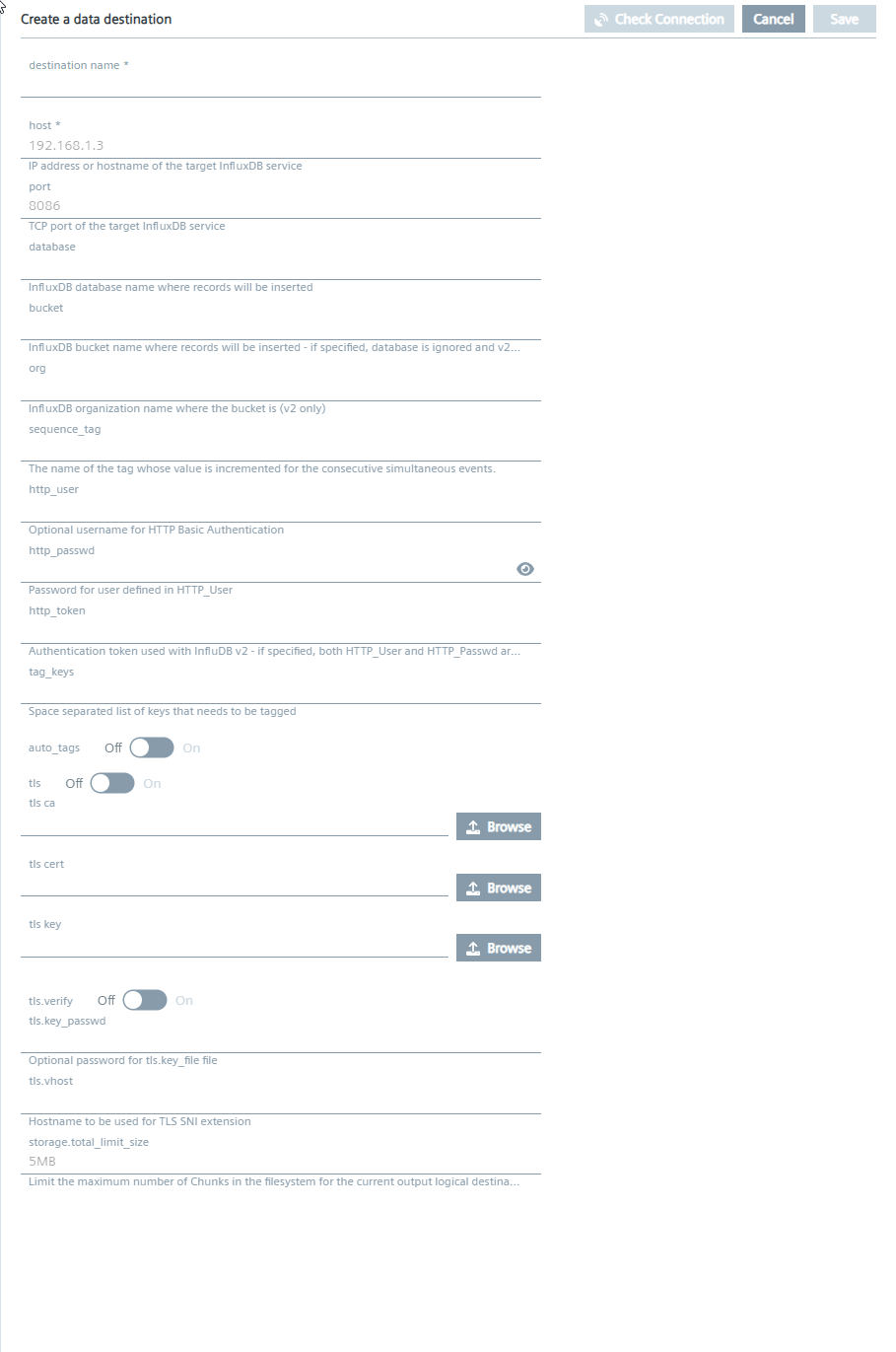
| Field | Description | required |
|---|---|---|
| destination name | name of destination | Yes |
| host | target influxdb server | Yes |
| port | target influxdb server port, default 8086 |
No |
| Database | InfluxDB database name where records will be inserted. Used for Influxdb V1 |
No |
| bucket | InfluxDB bucket name where records will be inserted - if specified, database is ignored and v2 of API is used |
No |
| org | InfluxDB organization name where the bucket is (v2 only) |
No |
| Sequence_Tag | The name of the tag whose value is incremented for the consecutive simultaneous events. default _seq |
No |
| http_user | Optional username for Basic Auth | No |
| http_password | Optional password for Basic Auth | No |
| HTTP_Token | Authentication token used with InfluDB v2 - if specified, both HTTP_User and HTTP_Passwd are ignored |
No |
| Tag_Keys | Space separated list of keys that needs to be tagged | No |
| Auto_Tags | Automatically tag keys where value is string. This option takes a boolean value: True/False, On/Off. default off |
No |
| tls | Enable/disable tls ,default On |
Yes |
| tls.ca | upload ca certificate | No |
| tls.cert | upload local certificate | No |
| tls.key | upload local private key | No |
| tls.verify | Verify server side certificate or not | No |
| tls.key_password | The password which protects private key | No |
| tls.vhost | Fluent Bit supports TLS server name indication. If you are serving multiple hostnames on a single IP address (a.k.a. virtual hosting), you can make use of tls.vhost to connect to a specific hostname. https://docs.fluentbit.io/manual/administration/transport-security#connect-to-virtual-servers-using-tls | No |
| storage.total_limit_size | Limit the maximum number of Chunks in the filesystem for the current output logical destination. https://docs.fluentbit.io/manual/administration/buffering-and-storage#output-section-configuration | No |
Kafka¶
More info please visit Fluent Bit 3.1.9 kafka output
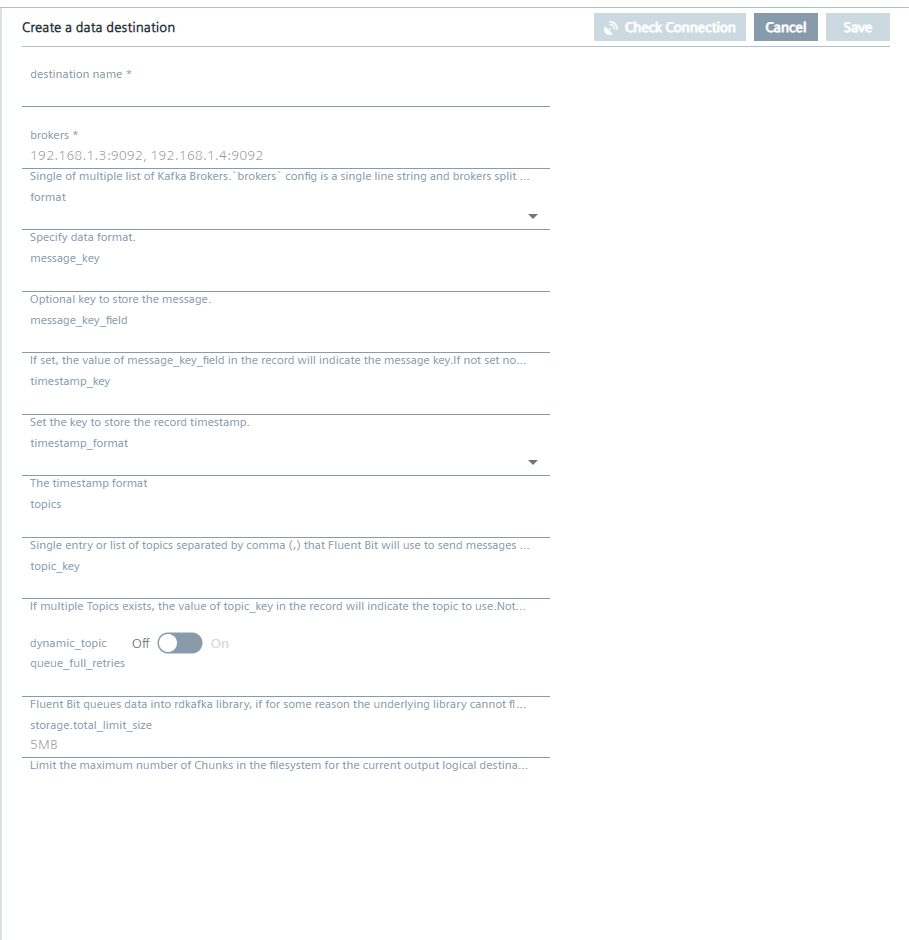
| Field | Description | required |
|---|---|---|
| destination name | name of destination | Yes |
| brokers | Single of multiple list of Kafka Brokers, e.g: 192.168.1.3:9092, 192.168.1.4:9092. | Yes |
| format | Specify data format, options available: json, msgpack. default json |
No |
| message_key | Optional key to store the message | No |
| message_key_field | If set, the value of Message_Key_Field in the record will indicate the message key. If not set nor found in the record, Message_Key will be used (if set). | No |
| timestamp_key | Set the key to store the record timestamp | No |
| timestamp_format | iso8601 or double , default double |
No |
| topics | Single entry or list of topics separated by comma (,) that Fluent Bit will use to send messages to Kafka. If only one topic is set, that one will be used for all records. Instead if multiple topics exists, the one set in the record by Topic_Key will be used | No |
| topic_key | If multiple Topics exists, the value of Topic_Key in the record will indicate the topic to use. E.g: if Topic_Key is router and the record is {"key1": 123, "router": "route_2"}, Fluent Bit will use topic route_2. Note that if the value of Topic_Key is not present in Topics, then by default the first topic in the Topics list will indicate the topic to be used. | No |
| dynamic_topic | adds unknown topics (found in Topic_Key) to Topics. So in Topics only a default topic needs to be configured , default off |
No |
| queue_full_retries | Fluent Bit queues data into rdkafka library, if for some reason the underlying library cannot flush the records the queue might fills up blocking new addition of records. The queue_full_retries option set the number of local retries to enqueue the data. The default value is 10 times, the interval between each retry is 1 second. Setting the queue_full_retries value to 0 set's an unlimited number of retries. | No |
| storage.total_limit_size | Limit the maximum number of Chunks in the filesystem for the current output logical destination. https://docs.fluentbit.io/manual/administration/buffering-and-storage#output-section-configuration | No |
S3¶
More info please visit Fluent Bit 3.1.9 s3 output
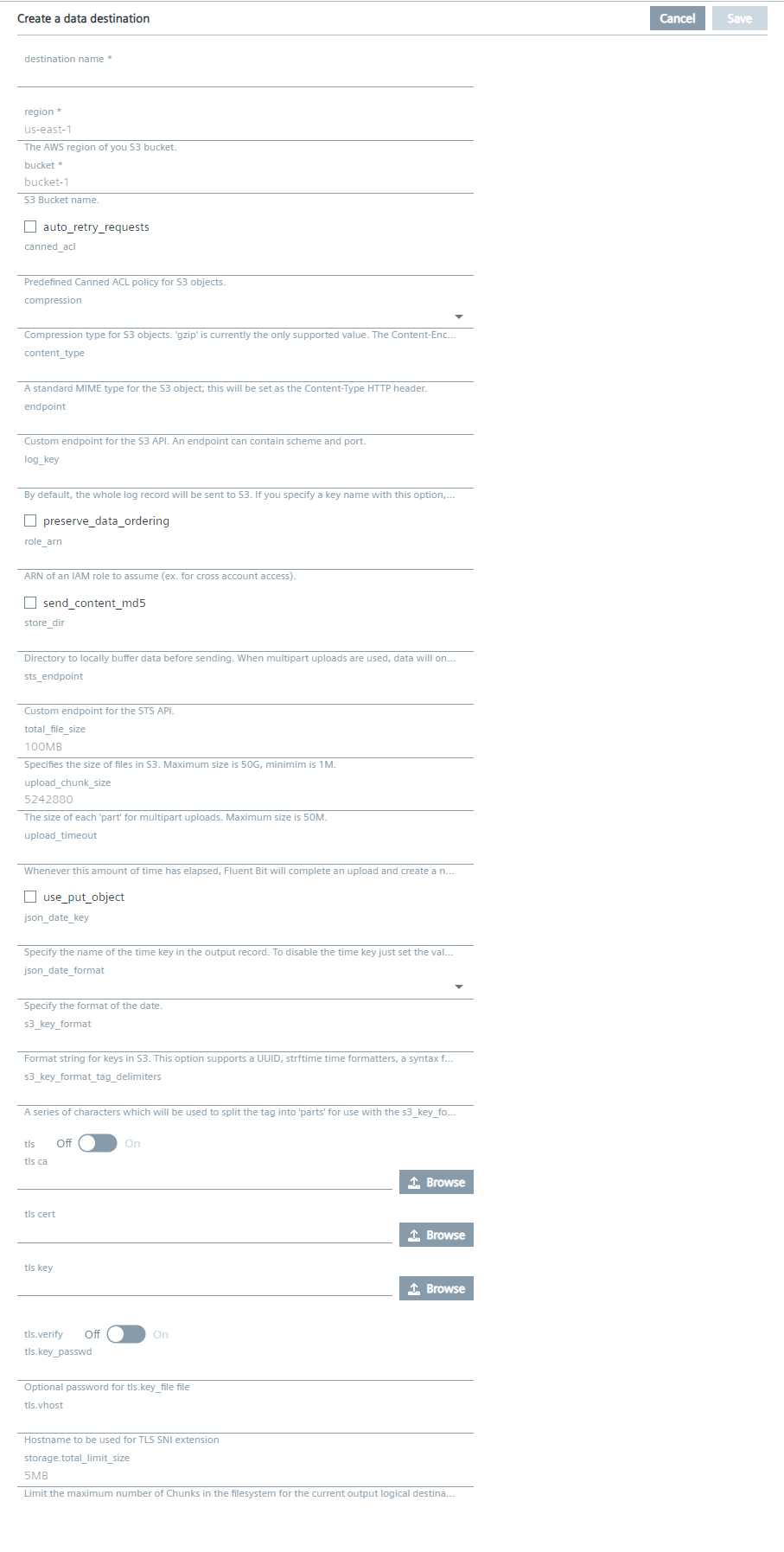
| Field | Description | required |
|---|---|---|
| destination name | name of destination | Yes |
| region | The AWS region of your S3 bucket , default us-east-1 |
Yes |
| bucket | S3 Bucket name | Yes |
| access_key_id | The access key id of a user who has permission for the bucket | Yes |
| access_secret_key | The secret access key of a user who has permission for the bucket | No |
| auto_retry_requests | Immediately retry failed requests to AWS services once. This option does not affect the normal Fluent Bit retry mechanism with backoff. Instead, it enables an immediate retry with no delay for networking errors, which may help improve throughput when there are transient/random networking issues. , default true |
No |
| canned_acl | Predefined Canned ACL policy for S3 objects. see more at https://docs.aws.amazon.com/AmazonS3/latest/userguide/acl-overview.html#canned-acl | No |
| compression | Compression type for S3 objects. 'gzip' is currently the only supported value. The Content-Encoding HTTP Header will be set to 'gzip'. Compression can be enabled when use_put_object is on. If Apache Arrow support was enabled at compile time, you can set 'arrow' to this option. | No |
| content_type | A standard MIME type for the S3 object; this will be set as the Content-Type HTTP header. | No |
| endpoint | Custom endpoint for the S3 API. An endpoint can contain scheme and port. | No |
| log_key | By default, the whole log record will be sent to S3. If you specify a key name with this option, then only the value of that key will be sent to S3. For example, if you are using Docker, you can specify log_key log and only the log message will be sent to S3. | No |
| preserve_data_ordering | Normally, when an upload request fails, there is a high chance for the last received chunk to be swapped with a later chunk, resulting in data shuffling. This feature prevents this shuffling by using a queue logic for uploads. | No |
| role_arn | ARN of an IAM role to assume (ex. for cross account access). | No |
| send_content_md5 | Send the Content-MD5 header with PutObject and UploadPart requests, as is required when Object Lock is enabled. | No |
| sts_endpoint | Custom endpoint for the STS API. | No |
| total_file_size | Specifies the size of files in S3. Maximum size is 50G, minimim is 1M. | No |
| upload_chunk_size | The size of each 'part' for multipart uploads. Max: 50M | No |
| upload_timeout | Whenever this amount of time has elapsed, Fluent Bit will complete an upload and create a new file in S3. For example, set this value to 60m and you will get a new file every hour. | No |
| use_put_object | Use the S3 PutObject API, instead of the multipart upload API. When this option is on, key extension is only available when $UUID is specified in s3_key_format. If $UUID is not included, a random string will be appended at the end of the format string and the key extension cannot be customized in this case. | No |
| json_date_key | Specify the name of the time key in the output record. To disable the time key just set the value to false. | No |
| json_date_format | Specify the format of the date. Supported formats are double, epoch, iso8601 (eg: 2018-05-30T09:39:52.000681Z) and java_sql_timestamp (eg: 2018-05-30 09:39:52.000681). default iso8601 |
No |
| s3_key_format | Format string for keys in S3. This option supports a UUID, strftime time formatters, a syntax for selecting parts of the Fluent log tag using a syntax inspired by the rewrite_tag filter. Add $UUID in the format string to insert a random string. Add $INDEX in the format string to insert an integer that increments each upload. Add $TAG in the format string to insert the full log tag; add $TAG[0] to insert the first part of the tag in the s3 key. The tag is split into “parts” using the characters specified with the s3_key_format_tag_delimiters option. Add extension directly after the last piece of the format string to insert a key suffix. If you want to specify a key suffix and you are in use_put_object mode, you must specify $UUID as well. More explanations can be found in use_put_object option. See the in depth examples and tutorial in the documentation. | No |
| s3_key_format_tag_delimiters | A series of characters which will be used to split the tag into 'parts' for use with the s3_key_format option. See the in depth examples and tutorial in the documentation. | No |
| tls | Enable/disable tls ,default On |
Yes |
| tls.ca | upload ca certificate | No |
| tls.cert | upload local certificate | No |
| tls.key | upload local private key | No |
| tls.verify | Verify server side certificate or not | No |
| tls.key_password | The password which protects private key | No |
| tls.vhost | Fluent Bit supports TLS server name indication. If you are serving multiple hostnames on a single IP address (a.k.a. virtual hosting), you can make use of tls.vhost to connect to a specific hostname. https://docs.fluentbit.io/manual/administration/transport-security#connect-to-virtual-servers-using-tls | No |
| storage.total_limit_size | Limit the maximum number of Chunks in the filesystem for the current output logical destination. https://docs.fluentbit.io/manual/administration/buffering-and-storage#output-section-configuration | No |
Syslog¶
More info please visit Fluent Bit 3.1.9 syslog output
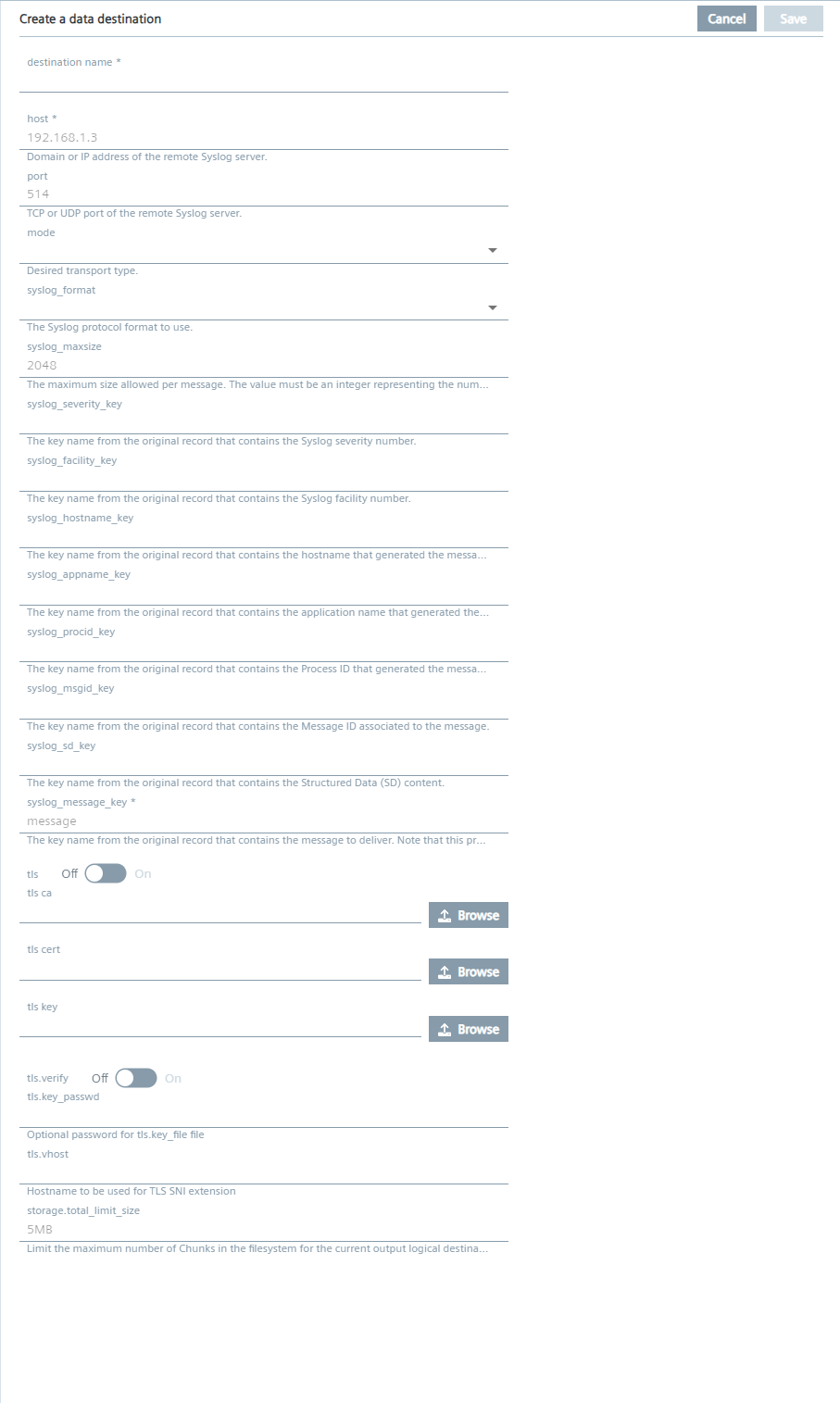
| Field | Description | required |
|---|---|---|
| destination name | name of destination | Yes |
| host | remote server | Yes |
| port | server port, default 514 | No |
| mode | Desired transport type. Available options are tcp, tls and udp , default udp |
No |
| syslog_format | The Syslog protocol format to use. Available options are rfc3164 and rfc5424. , default rfc5424 |
No |
| syslog_maxsize | The maximum size allowed per message. The value must be an integer representing the number of bytes allowed. If no value is provided, the default size is set depending of the protocol version specified by syslog_format. rfc3164 sets max size to 1024 bytes. rfc5424 sets the size to 2048 bytes | No |
| syslog_severity_key | The key name from the original record that contains the Syslog severity number. This configuration is optional. | No |
| syslog_facility_key | The key name from the original record that contains the Syslog facility number. This configuration is optional. | No |
| syslog_hostname_key | The key name from the original record that contains the hostname that generated the message. This configuration is optional. | No |
| syslog_appname_key | The key name from the original record that contains the application name that generated the message. This configuration is optional. | No |
| syslog_procid_key | The key name from the original record that contains the Process ID that generated the message. This configuration is optional. | No |
| syslog_msgid_key | The key name from the original record that contains the Message ID associated to the message. This configuration is optional. | No |
| syslog_sd_key | The key name from the original record that contains the Structured Data (SD) content. This configuration is optional. | No |
| syslog_message_key | The key name from the original record that contains the message to deliver. Note that this property is mandatory, otherwise the message field in syslog will be empty. e.g. Fetching System.log or App log, this syslog_message_key should be set to log. If using syslog to fetch cpu.used data, syslog_message_key should be set as used. For more information please visit Metrics data fields to get more metrics data fields |
Yes |
| tls | Enable/disable tls ,default On |
Yes |
| tls.ca | upload ca certificate | No |
| tls.cert | upload local certificate | No |
| tls.key | upload local private key | No |
| tls.verify | Verify server side certificate or not | No |
| tls.key_password | The password which protects private key | No |
| tls.vhost | Fluent Bit supports TLS server name indication. If you are serving multiple hostnames on a single IP address (a.k.a. virtual hosting), you can make use of tls.vhost to connect to a specific hostname. https://docs.fluentbit.io/manual/administration/transport-security#connect-to-virtual-servers-using-tls | No |
| storage.total_limit_size | Limit the maximum number of Chunks in the filesystem for the current output logical destination. https://docs.fluentbit.io/manual/administration/buffering-and-storage#output-section-configuration | No |
Tcp¶
The tcp output plugin allows to send records to a remote TCP server. The payload can be formatted in different ways as required.
More info please visit Fluent Bit 3.1.9 TCP & TLS output
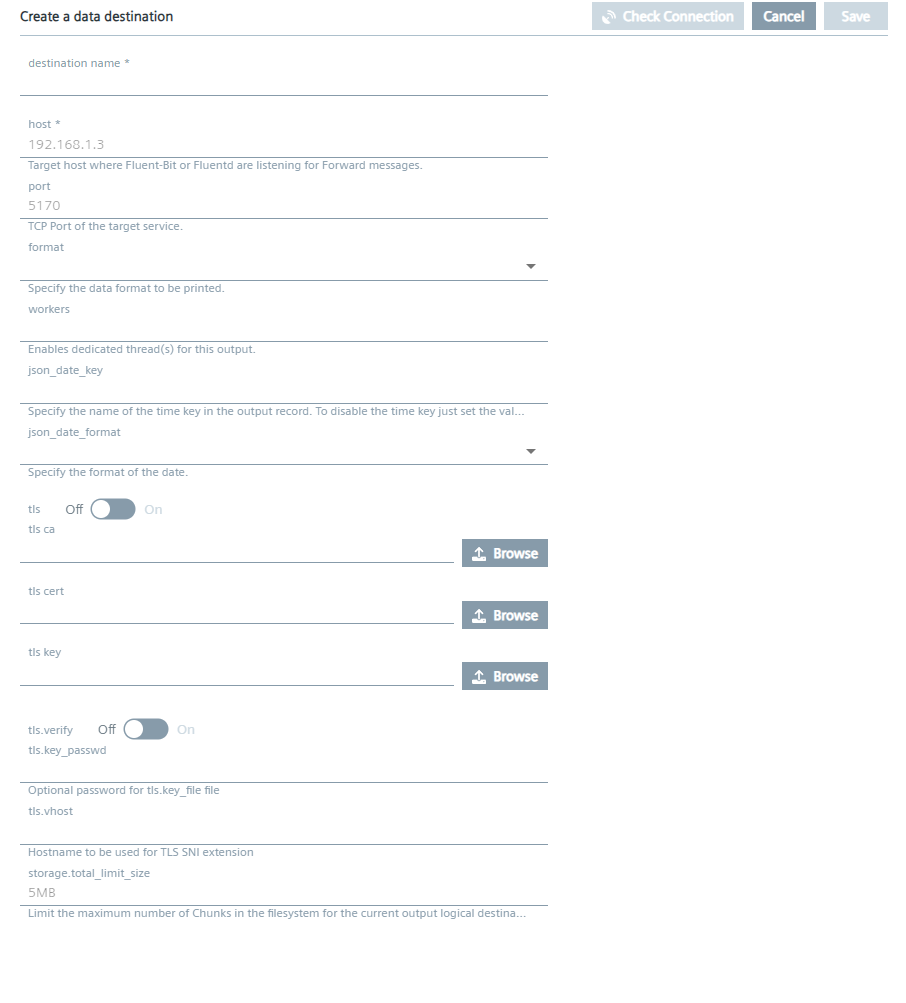
| Field | Description | required |
|---|---|---|
| destination name | name of destination | Yes |
| host | remote tcp server | Yes |
| port | server port | Yes |
| format | Specify the data format to be printed. Supported formats are msgpack json, json_lines and json_stream. default msgpack |
No |
| workers | Enables dedicated thread(s) for this output. default 2 | No |
| json_date_key | Specify the name of the time key in the output record. To disable the time key just set the value to false. | No |
| json_date_format | Specify the format of the date. Supported formats are double, epoch, iso8601 (eg: 2018-05-30T09:39:52.000681Z) and java_sql_timestamp (eg: 2018-05-30 09:39:52.000681). default iso8601 |
No |
| tls | Enable/disable tls ,default On |
Yes |
| tls.ca | upload ca certificate | No |
| tls.cert | upload local certificate | No |
| tls.key | upload local private key | No |
| tls.verify | Verify server side certificate or not | No |
| tls.key_password | The password which protects private key | No |
| tls.vhost | Fluent Bit supports TLS server name indication. If you are serving multiple hostnames on a single IP address (a.k.a. virtual hosting), you can make use of tls.vhost to connect to a specific hostname. https://docs.fluentbit.io/manual/administration/transport-security#connect-to-virtual-servers-using-tls | No |
| storage.total_limit_size | Limit the maximum number of Chunks in the filesystem for the current output logical destination. https://docs.fluentbit.io/manual/administration/buffering-and-storage#output-section-configuration | No |
Websocket¶
The websocket output plugin allows to flush your records into a WebSocket endpoint.
More info please visit Fluent Bit 3.1.9 Websocket
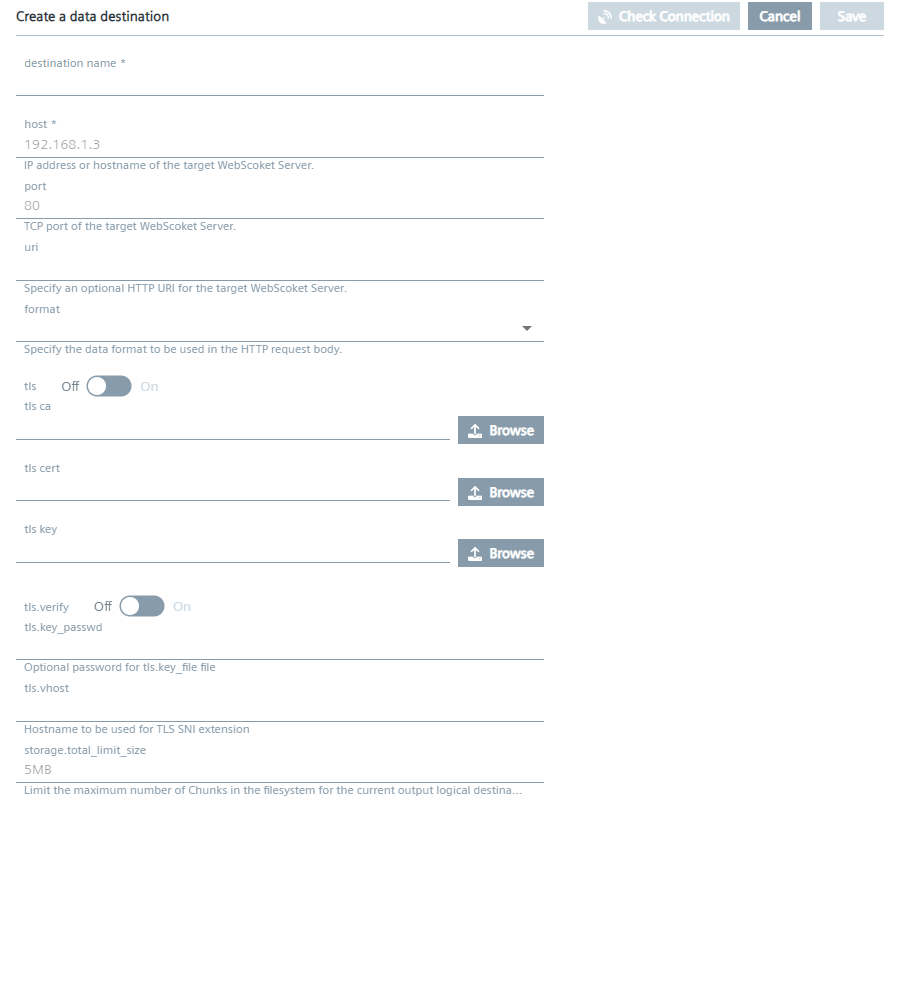
| Field | Description | required |
|---|---|---|
| destination name | name of destination | Yes |
| host | remote server host | Yes |
| port | remote server port , default 80 |
No |
| uri | Specify an optional HTTP URI for the target websocket server, e.g: /something |
No |
| format | Specify the data format to be printed. Supported formats are msgpack json, gelf, json_lines and json_stream. default msgpack |
No |
| tls | Enable/disable tls ,default On |
Yes |
| tls.ca | upload ca certificate | No |
| tls.cert | upload local certificate | No |
| tls.key | upload local private key | No |
| tls.verify | Verify server side certificate or not | No |
| tls.key_password | The password which protects private key | No |
| tls.vhost | Fluent Bit supports TLS server name indication. If you are serving multiple hostnames on a single IP address (a.k.a. virtual hosting), you can make use of tls.vhost to connect to a specific hostname. https://docs.fluentbit.io/manual/administration/transport-security#connect-to-virtual-servers-using-tls | No |
| storage.total_limit_size | Limit the maximum number of Chunks in the filesystem for the current output logical destination. https://docs.fluentbit.io/manual/administration/buffering-and-storage#output-section-configuration | No |
Splunk¶
The Splunk output plugin allows to flush your records into a Splunk HTTP Event Collector.
More info please visit Fluent Bit 3.1.9 Splunk
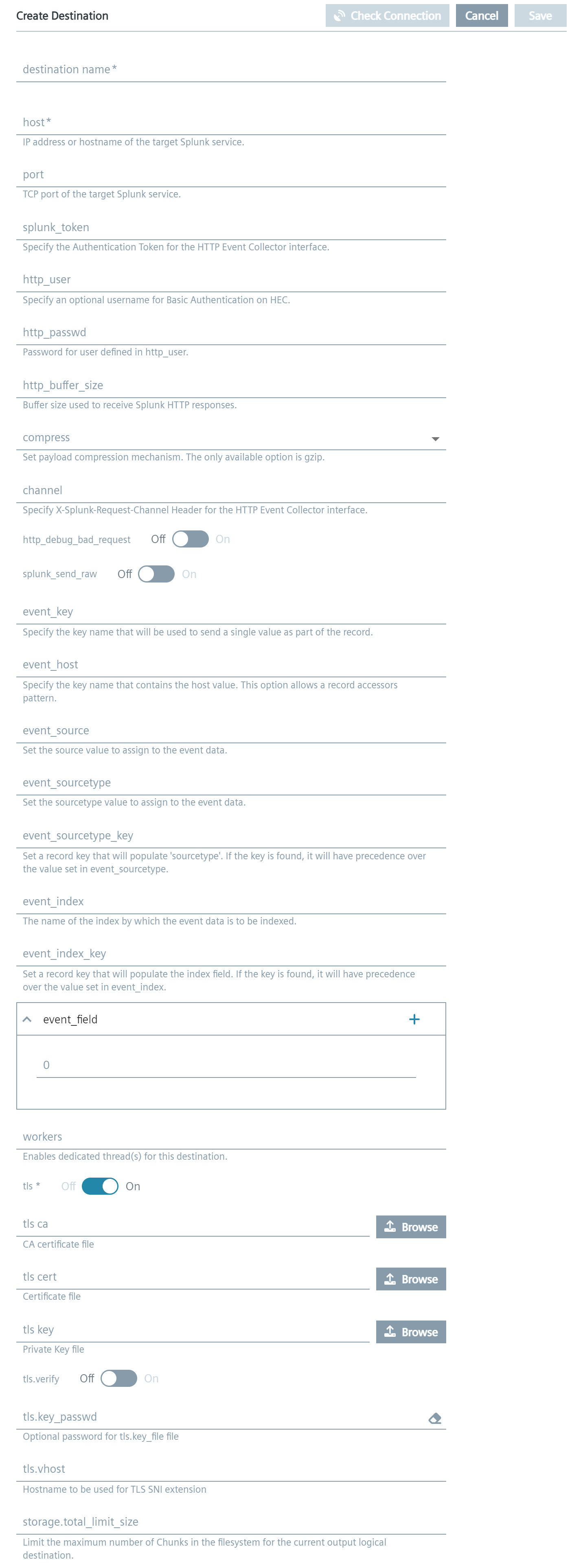
| Field | Description | required |
|---|---|---|
| destination name | name of destination | Yes |
| host | IP address or hostname of the target Splunk service. | Yes |
| port | TCP port of the target Splunk service, default 8088 |
No |
| splunk_token | Specify the Authentication Token for the HTTP Event Collector interface. | Yes |
| http_user | Specify an optional username for Basic Authentication on HEC. | No |
| http_passwd | Password for user defined in http_user. | No |
| http_buffer_size | Buffer size used to receive Splunk HTTP responses. | No |
| compress | Set payload compression mechanism. The only available option is gzip. | No |
| channel | Specify X-Splunk-Request-Channel Header for the HTTP Event Collector interface. | No |
| http_debug_bad_request | If the HTTP server response code is 400 (bad request) and this flag is enabled, it will print the full HTTP request and response to the stdout interface. This feature is available for debugging purposes. | No |
| splunk_send_raw | When enabled, the record keys and values are set in the top level of the map instead of under the event key. | No |
| event_key | Specify the key name that will be used to send a single value as part of the record. | No |
| event_host | Specify the key name that contains the host value. This option allows a record accessors pattern. | No |
| event_source | Set the source value to assign to the event data. | No |
| event_sourcetype | Set the sourcetype value to assign to the event data. | No |
| event_sourcetype_key | Set a record key that will populate 'sourcetype'. If the key is found, it will have precedence over the value set in event_sourcetype. | No |
| event_index | The name of the index by which the event data is to be indexed. | No |
| event_index_key | Set a record key that will populate the index field. If the key is found, it will have precedence over the value set in event_index. | No |
| event_field | Set event fields for the record. This option can be set multiple times and the format is key_name record_accessor_pattern. | No |
| workers | Enables dedicated thread(s) for this destination. | No |
| tls | Enable/disable tls ,default On |
Yes |
| tls.ca | upload ca certificate | No |
| tls.cert | upload local certificate | No |
| tls.key | upload local private key | No |
| tls.verify | Verify server side certificate or not | No |
| tls.key_password | The password which protects private key | No |
| tls.vhost | Fluent Bit supports TLS server name indication. If you are serving multiple hostnames on a single IP address (a.k.a. virtual hosting), you can make use of tls.vhost to connect to a specific hostname. https://docs.fluentbit.io/manual/administration/transport-security#connect-to-virtual-servers-using-tls | No |
| storage.total_limit_size | Limit the maximum number of Chunks in the filesystem for the current output logical destination. https://docs.fluentbit.io/manual/administration/buffering-and-storage#output-section-configuration | No |